R.J. Blain's Blog, page 75
February 10, 2015
Author Services: Amazon’s Giveaway Platform
 Amazon is on a roll in its efforts to dominate the digital marketplace. Today, Amazon has announced the release of its giveaway platform, a tool that is only partially viable for authors.
Amazon is on a roll in its efforts to dominate the digital marketplace. Today, Amazon has announced the release of its giveaway platform, a tool that is only partially viable for authors.
For all of ten seconds, I was convinced heaven had come down to Earth. Reality quick reasserted itself, never fear. Digital products, such as ebooks, are not eligible giveaway products.
Good news, however, is that paperback products that are prime eligible are eligible giveaway products.
I think I just found a reason to go back and redo all of my paperbacks. In case you hadn’t noticed, my entire paperback catalog is currently offline. I will be doing new releases in a different trim size in the near future, as well as correcting errors in the print versions and so on. This was a painful decision for me, and one I won’t have time to actually do for a while, but it will get done–eventually.
Once it is finished, I will be taking advantage of this tool for the paperbacks.
So, authors, rejoice! If you have paperback copies you want to give away on amazon, you now have a great tool to do it–and you do not need to be a member of KDP Select to take advantage of it.
Author Services: Amazon’s AMS Snubs Thriller/Mystery/Genre Authors
Amazon’s AMS, its new Pay Per Click advertising platform (yes, the one I talked about yesterday in this post), takes aim at the authors of thriller and mystery genres, with a notable number of civilian casualties in the fantasy, science fiction, and horror genres. What do these five distinct genres have in common? You guessed it–guns and weaponry.
Warning: Sarcasm and opinionated ranting ahead.
Buried deep within Amazon’s AMS services is a nasty little clause stating that no cover art featuring any sort of violence or guns may be used. In most advertising venues, there is generally leeway for certain amounts of ‘controversial’ content matter. Having worked in advertising as an office job for a few years, stupid content rules are nothing new to me. However, Amazon’s current no-weapons stance could spell disaster for self-publishers in its KDP Select system–and provide a damned good reason for authors like me to give up exclusivity, especially when Amazon has gone out of its way to piss off a great many of its exclusive users.
How did this all begin? I asked why Winter Wolf’s creative was rejected.
And I quote the CSR’s response to my query:
Thank you for reaching out to us. I am sorry for any inconvenience this may have caused to you.
I’ve checked your account and see that this ad campaign was rejected, since your cover image has firearms and weapons. This is not allowed as per the policy guideline of Amazon.
If you’d like to resubmit this campaign, please update the cover image and republish your book “Winter Wolf.”
A CSR agent continues the discussion with this little gem:
As a reference in relation to your inquiry, you may take a look at section “4. Unacceptable Ad Content” and “6. Placement Specific Guidelines” for details.
I’m unable to discuss other reasons behind the limitation of certain elements on Ads covers, however, this should always respond to equal terms for all the Amazon community in order to provide a good customer experience to avoid affecting sensitivity.
What pissed me off about this was the way the CSR suggested I update my cover image and republish my book as a solution to this problem. I put the text in red, because I’m imagining all of the blood my fictional book is currently shedding.
Seriously, excuse me? That cover cost hundreds of dollars. It was tens upon tens of hours of work for my artist.
How about this, Amazon? Why don’t you pay for the new cover art? You can also factor in the potential loss of revenue while the cover waits in a six plus month waiting list for alterations or repainting. While you’re at it, why don’t you also submit a proposal on how to create engaging art for the book that’s (properly) sanitized (to meet your guidelines) to the point that my alcohol-based hand cleaner develops self-esteem issues.
Heaven forbid someone’s sensibilities be offended.
For some reason, I suspect the resulting proposal would involve poor Nicole being forced to cling to some man’s leg. Wait, that won’t work either. By Amazon’s AMS guidelines, 90% of all romance covers should be rejected, too. (Whether or not Amazon will enforce the rules for romance cover art is yet to be seen.)
Hey, Amazon. Seriously, get your collective heads out of your asses. An obviously fictional weapon (note the CSR points out ‘firearms and weapons’ in the explanation) on a cover of a fictional story is not an endangerment anyone, nor is it going to affect sensitivities. I’d say it won’t impact your bottom line, but wait, yes it will: it’s a huge endangerment to your financial bottom line as you lose hundreds upon hundreds upon hundreds of dollars of potential sales as you cut out six distinctive genres of fiction. What’s the deal? Are you afraid someone might think your company supports terrorism if you allow advertisers to promote their fantasy, thriller, horror, etc covers?
And damn it, I’m going to say it, even if it pains me–a tasteful romance cover showing a bit of skin isn’t going to kill your poor, sheltered users either.
Delicate sensibilities, indeed.
Have you forgotten how bloody popular thrillers and mystery novels are? And romance, for that matter? And fantasy too, by the way. You know, things like Game of Thrones, Wheel of Time, and so on? Which, for the record, feature swords and general violence on (many/some of) their covers. (Which are weapons, by the way, in case you’re confused, Amazon–I think you are.)
But, if you’re going to take aim at weapons… why not just open fire on all of your major sources of income? According to the rules, many romance covers are doomed, though most will probably slip through without much issue.
I’ve got my popcorn out. Popcorn for you! Popcorn for me! Popcorn for all the riled up authors who want to make a living!
I’d love to hear if the romance authors out there have been hit with the rulings, or if Amazon’s playing nicer with the romance authors.
This policy (in my not-so-humble and rather annoyed opinion) has huge ramifications for authors like me, who feature guns and magical weaponry–including swords–on her covers. To keep this party properly open, I’m going to toss in tasteful displays of skin, too. Nicole’s showing some belly in that cover, after all.
Where is the line drawn for things like tasteful nudity and reasonable violence? Guns are right out. Swords are questionable at this point in time.
Supposedly, religion is supposed to be right out, but I have suspicions that Christian titles will be able to be promoted just fine. Things like that seem to happen with companies for some reason.
Now, before I start my rant about cover art and the presence of weaponry on them, I want to make this much clear: I am not anti-amazon as a result of this boneheaded move. Yes, I’m pissed, yes, I’m annoyed, yes, I’d like to smack around the desk monkey who thought this was a good idea, but Amazon represents almost the entirety of my income. I’ve tried non-exclusive, and that failure of an experiment netted me less than $20 in earnings and cost me a great deal of income. I’m definitely not happy about this current situation, as it significantly limits my tools, but amazon is my bread and butter at the moment.
While Amazon’s AMS has taken aim at almost all of my covers, Amazon is where most of my fans are. (And frankly put, if you wanted to support me, do so by clicking one of the links and buying a book or two for yourself or a friend. That’d be awesome, seeing that with the exception of Inquisitor, I likely can’t take advantage of the branding and general advertisements being offered by Amazon’s AMS.)
In short, I’d love to throw money at Amazon to help me connect with my fans–and I’m seriously peeved that this option has been lost to me because of an overzealous desk monkey who can’t understand that tasteful nudity, guns, swords, and other bits of weaponry does not constitute a support of horrible lack of morals, terrorism, or otherwise harm delicate sensibilities. I like to think that my covers are not in any way offensive. They are typical fantasy fare. If Amazon is so concerned about the delicate sensitivities of their users, get out of the fiction business.
Back on subject: Allow me to begin by showcasing my only book cover (Inquisitor’s) that is permissible according to these rules:

While I am of the opinion that this is a lovely cover, it’s a pretty good thing that at first glance, the creative managers over at amazon didn’t zoom in the picture and notice the exploded car behind her. I mean, that’s technically an act of violence, right?
Right. So, technically, if the creative ad approval team was really observant and decided to play hard to the rules, this cover isn’t allowed either. What fun.
The cover that brought the whole issue to light is my
Most of the covers include daggers or swords, but Winter Wolf’s has firearms, in this case, an assault rifle and a pistol.
At least I slipped Inquisitor through the ad creative requirements.
To be fair, it was nice of the CSR to express concern over whether or not I’d continue publishing with Amazon. At least their AMS sanitation hasn’t reached out for all cover art on titles–yet. I’m a small fish at this point, but it’s nice they want me around… sort of.
Rules like this annoy me so much. How long will it be until Amazon (and other big distributors) decide that their advertising creative rules should apply to general cover art? It wouldn’t surprise me.
Having worked in the glorious world of advertising before… all I can say is Woohooohooo, it’s all been done, wooohoooohooo, it’s all been done, wooohoooohooo, it’s all been dooooonnnnneeeee before…!
February 9, 2015
Author Services: Amazon’s PPC Advertising Platform

For those using KDP Select, Amazon’s exclusive self-publishing platform, an interesting new tool has been released. I don’t even know what the platform is technically called. It’s a PPC/CPC (Pay per click/Cost per click) system designed to allow self-publishers to promote their novels.
Before I became a novelist, I worked in the marketing department for an online dating site. Before I was shifted to online dating, I worked in marketing for adult websites. PPC is a form of advertising we used often, as it was much easier to judge results and manage ROI (Return on Investment) compared to other types of advertising, including CPM (Cost per Mille, which is a cost per every 1,000 impressions/views.)
Since the definitions make a difference, I’m going to take a few minutes to discuss the differences between PPC and CPM. I’m also going to talk about why these forms of advertising might be a good thing for authors.
I’m always going to be a fan of PPC. It’s easier to control. Spending isn’t undermined by adblocking software. If you do not get the click, you do not spend the cash. In CPM, the advertiser doesn’t give a hoot if the users click on the banner or advertisement. It’s a fast way to spend a lot of money very quickly.
In general, unless you have gotten ad space on a very predominant site that has managed to get around adblocking software, I will never recommend CPM campaigns. At my job, we’d see some success with CPM, but it was always, always, always a higher risk.
In the case of a click on amazon, it means someone is actively looking at your book and deciding whether or not to purchase it. That’s a good thing. You know you’ve gotten in front of your readers.
I do not have a huge budget for advertising this year, but I’ve decided to give KDP’s new advertising platform a test drive.
This post will share my experiences with the first phase of setting up a new campaign with amazon.
Step One: Access the Advertising Platform
It’s pretty simple: Instead of Manage Benefits, it now reads “Promote and Advertise.” Clicking on this link will take you into the advertising platform.
You will have to log in for security purposes.
Step Two: Choose your Poison
You can choose to use the free benefits of KDP as normal. You also have the option to Run an ad campaign. That’s what we click in order to access the ad management system.
I am going to set up a campaign for Inquisitor for this post. I’ve already set up one for Winter Wolf, which is currently in the creative hellhole of creative review with Amazon. (Results pending.)

You will notice several things about this screen shot. First, you will see that one of my titles is ineligible. Preorders can’t be enrolled in the ad campaign. Only novels that are currently enrolled in KDP Select and are available for sale can opt into an advertising campaign.
I’m selecting Inquisitor.
Step Three: Choose Outlet, Costs, & Budget
There is a lot going on here, but it’s pretty easy. If you have never done PPC/CPM before, I really recommend that you use ‘By Interest’ as it is easier to set up. By Interest is using a broad field–in my case, all users interested in Science Fiction & Fantasy.
The campaign name is to let you see what the campaign is for at a glance in the overview system.
The Cost-Per-Click Bid is your most important decision, with Budget a close second. Budget is how much you want to spend over the entirety of the campaign. In my case, I’m using the minimum budget allowance, which is $100. It’ll be charged to my credit card in $1-100 increments. If I spend all of my budget in an hour, they’ll just ding my credit card once. If it takes me a month to spend my budget, they will hit my card in lower intervals.
I’m leaving the campaign settings alone; if I use up my budget before the end date, great, if not–great!
Now, I selected $0.05 as my capped CPC. Here’s where things will get iffy for new advertisers. CPC is a bid system. In order for your advertisement to show, you must be the highest bidder. The highest bidder pays one cent more than the second highest bidder. If the ad spot has a second highest bidder of $0.04, my ad will show, costing me $0.05 for the impression.
I’m only charged if someone clicks on the advertisement.
In theory, I could show a bunch of advertisements at $0.01. $0.05 is simply my highest allowed bid. It isn’t necessarily the amount I’ll always pay per click. It all depends on what other advertisers are doing–and how many times my ad has been shown to a specific user. (While I can’t confirm this, I’d bet my socks Amazon is tracking that information.)
Step Four: Submit Campaign for Review. Wait.
The waiting period is between 24-72 hours. My Winter Wolf campaign was accepted… and then rejected… within 12 hours.
Apparently, my book cover was not sufficient as creative. This is baffling to me, as so far, there doesn’t appear to be a way to submit new creative to their system. Creative being the advertising content to be used on Amazon. They use the book’s cover.
I have contacted Amazon asking for an explanation.
Since Winter Wolf’s cover was rejected by Amazon, I’m expecting Inquisitor’s cover to likewise be rejected by Amazon. But, we’ll see, I guess.
My Initial Thoughts
Amazon gets a full 5* out of 5* for ease of set up. I’ve done a lot of CPC/CPM and other types of advertisements over the years. This one was one of the easiest. It’s minimal, but it’s minimal in all of the right ways.
Their acceptance and rejection of Winter Wolf’s campaign has me quite annoyed, however, so they get a 0* out of 5* for insufficient information on why the accepted campaign was rejected half an hour later.
I may change this rating if they get back to me with a better explanation than “We’re rejecting this campaign because of non-explanatory reason.”
If I get a campaign accepted, I will continue this author services review.
That said, if I get a campaign accepted, I have relatively high hopes for the performance of this sort of campaign. It has a great deal of potential.
If I don’t get a campaign accepted and someone else does and is willing to share their sales data with me, I can continue the review using someone else’s data. I would require full data on the title being sold, a breakdown of additional advertising/marketing being done on the title, and financials relating to the promotion.
Once I learn why Winter Wolf was rejected for advertising, I’ll let you know. Until then, just imagine my frustrated screams echoing in the desert wasteland that is my mind at the moment.
And my tossing flaming balls of death down into the deeps. Because frustrating.
February 8, 2015
On Writing: Resolve, Productivity, Work Habits, and Motivations
Welcome to February of 2015. Many people are fighting with resolutions. Some are succeeding. Some are failing. Some never got beyond the point of saying they’d try. Actually, I might go out on a limb at this point and state that I believe most people have already quit or failed in their goals.
I used to be a frequent flier of the failed resolutions brigade. The wreckage of my past attempts litter my life. Some still smolder, haunting me with my failure to succeed at something I thought should have been easy.
While I do view the New Year as a way to reset and start with a fresh slate, I’ve given up on resolutions for the most part. I do make resolutions, but I don’t make them for January 1st. If I want to do something, if I truly want to do something, I start right away. Today. Any day I decide it needs to be done.
It’s not much of a resolution if I don’t believe in it enough to do it now. But, I want to talk about the reason why resolutions shouldn’t be completely ignored. The base word of resolution is resolve… and having the resolve to do something is a big deal. In a way, I think we’ve cheapened and lessened our ability to have solid resolve by putting so much behind a single date to be resolved to do anything at all.
Sometime in December, I started seriously pursuing my own writing. My clients came second, my novels came first. My clients (being as awesome as they are) knew this, and knew when I did work on their novels, it got my full attention. I just made sure I wasn’t spending the majority of my day on their stories, instead making sure I was focusing on mine as the priority.
Since I hardened my resolve, I finished drafting one novel. I am halfway through the drafts of two newer pieces. I am also well on my way to completing Storm Surge.
 Storm Surge is currently available for preorder and will release on April 14, 2015. If you enjoyed Storm Without End, please consider purchasing a copy of the book! (Or, if you enjoy this blog and you want to support me as an author, take a look at all of my available titles and either purchase one for yourself or give a copy to someone as a gift.)
Storm Surge is currently available for preorder and will release on April 14, 2015. If you enjoyed Storm Without End, please consider purchasing a copy of the book! (Or, if you enjoy this blog and you want to support me as an author, take a look at all of my available titles and either purchase one for yourself or give a copy to someone as a gift.)
You can also be a huge help to me by adding one (or all) of my titles to your amazon wishlist. This lets amazon know people are interested in the book.
I’m really excited about Storm Surge. While I released the first book of the Fall of Erelith series before I published the first book of Requiem for the Rift King, Kalen and Breton are special to me–their story is the one that made me truly, truly want to be an author, no matter what. There’s definitely quite a lot of sentimental value in this series for me. I’ll be honest–this series isn’t a money maker for me. (I wish.) But it’s a series I’m writing for me in equal proportion as writing for my readers and fans.
Sometimes, the return of investments matters less to me. This is one of those instances. Of course, I’d love for Requiem for the Rift King to take flight and do well, but that’s a matter of luck and readers finding me–and my books.
In the meantime, I will simply hold onto the hope that those who do read Requiem will enjoy the story–even if I break all of the rules of writing to tell the story I want to tell versus the story the fantasy-reading market tells me I should tell.
Not good financial sense, but that’s life. Even if no one bought any of the books, I would still write them and release them.
I’ve taken quite the detour from the original subject: resolving to do something. But, I think my rambling about Storm Surge does demonstrate the most important part of my point. I am resolved to do this because it is something I truly want to do. I am willing to put in the hard work and effort because it is something I want for myself, not because others tell me I should do this.
I have motivation and desire backing my resolution. Because of this reason, I refuse to accept anything other than success.
I’m told, time and time again, that I should resolve to do a lot of things–lose weight, eat healthier (and lose weight), clean the house (I should, as dust allergies suck), exercise, and all of these good things everyone else thinks should be done this time of year.
I’ve learned my lesson. Unless I truly want it, I won’t do it. Peer pressure just isn’t sustainable. At the end of the day, the only person responsible for my successes and failures is me.
I’ve resolved to make my writing career a success, come hell, high (sewage) water, or anything else that comes in my way.
Ever since I decided that, ever since I embraced my desire to write and allow it to be my motivation, resolving to get it done wasn’t that hard–neither was implementing it.
But maybe, just maybe, that’s because I also accepted that no one is responsible for me except for me. I like encouragement. It helps, I won’t deny that–but if I’m not willing to do things for myself, I certainly can’t expect others to want to carry me towards my goals. As a result of deciding this for myself, I’ve improved my habits and productivity. The habits formed because I decided I needed to do this work. I became more productive because I decided what was important to me.
Better work habits and productivity weren’t the means to an end; they were the direct result of my efforts. My resolve, motivation, drive, and desire forced my to sit down and work. I didn’t resolve to improve my habits or productivity. I decided to sit down and finish what I started–the habits and productivity changes were the consequences of accomplishing my goals.
And that’s working really well for me.
It’s February. Is there anything you have decided to do?
Every day is a new day. This moment is all we’re guaranteed.
What are you going to do with the time you have?
Me? I have writing to do, so I’m going to hop to it.
February 4, 2015
SFWA Opening Doors to Self-Published Authors
SFWA, AKA Science Fiction & Fantasy Writers Association of America, held a referendum regarding the admittance of self-published authors and small presses for membership into the organization. The referendum passed in a 6 to 1 in favor of expanding membership.
You can read all about the upcoming changes, effective March 1, 2015, here.
 In May, 2014, I released my first urban fantasy, Inquisitor. It is the first novel of the Witch & Wolf series. The Witch & Wolf series tells the stories of those who have been impacted by the Inquisition, the organization responsible for controlling and containing all things supernatural and paranormal.
In May, 2014, I released my first urban fantasy, Inquisitor. It is the first novel of the Witch & Wolf series. The Witch & Wolf series tells the stories of those who have been impacted by the Inquisition, the organization responsible for controlling and containing all things supernatural and paranormal.
Unlike most UF series, the first three novels (#3 expected in 2016) are told from different perspectives.
SFWA membership has been a long-time dream for me. It’s also been a dream I never thought would actually happen. Traditional publication is something I flirted with. I was in talks with an agent for quite a few months about a book, but we ultimately didn’t work together. While he invited me to resubmit things to him later, I never did. Why?
I wanted to get to what I like doing: writing. While there are a lot of great things about traditional publication, I like doing things at my own pace. I like controlling my cover art. I like coming up with new stories, and having the ability to step back from what I’m currently working on to let my creativity take wing and soar.
I enjoy almost the every aspect of being an author.
According to SFWA’s new rules, effective March 1, 2015, Inquisitor qualifies for membership.
I almost cried last night. I’m not sure how I avoided it, really–I suspect it is due to trying not to get my hopes up way too high–after all, they could reject my application when I apply! (That would break me.)
None of my other novels qualify at this moment, but Winter Wolf is getting close. I’d love for all of my novels to qualify! That would be so amazing. Will they? Who knows. I guess one day I’ll find out.
But this is such good news for SFWA–and for me. One of my dreams, something I really wanted but hadn’t been able to accomplish, is now in my grasp. I looked at the requirements and realized I was actually making progress.
I could play with the big boys and girls.
SFWA membership, in the grand scheme of things, probably won’t mean all that much to me. I’m very independent. I do things at my own pace. But I got there.
Hard work sometimes does pay off, and this makes me hopeful for my future as an author.
February 3, 2015
The Evolution of Cover Art Text
Yesterday, I gushed about the cover art creation process. Today, I took the mock up from Chris Howard and gave it to my texting lady, who also happens to be an author and one of my best friends. Go meet Brooke Johnson! Seriously, she’s awesome.
Here is what we started with:

Rider of the Sun Horse – Mock Up
The way I work with Brooke Johnson is quite a bit different than how I work with Chris Howard. Chris and I work exclusively by email. Brooke and I rarely email; the only thing we email is final image files. The rest is done via instant messaging.
Brooke Johnson loves playing with cover art; she is pretty skilled at graphics arts in general, and has the education to back her interest. We fell together a long time ago when I was struggling with the typography for my first novel.
She started doing my texting with my second novel and we’ve been working together ever since.
This post will show the progression of the typography mock up for Rider of the Sun Horse. All conversations have been used with permission. Because we can get quite rowdy, BLEEPS! will be used to hide certain details.
I’m not an expert on typography. I’m an author who likes pretty covers. If you want an expert on typography, hire a graphic artist.
RJ: /giggle
Okay, for RotSH.
I am torn between a fancy schmancy fantasy style font with all those… fancy things
or the rugged eroded font I use for SWE and co. Or something inbetween
This is all of the instruction I gave to Brooke. That’s it. I know nothing about graphic design, and it shows. I mean, I’m all like fancy things, right?
She is such a good sport.
Brooke: i have a font in mind that i think would look good
At this point, I’m giggling like a maniac. I wait a while, working eagerly on Storm Surge so I’m not annoying my friend while she’s hard at work playing in Photoshop.
Time passes. I’m drinking coffee. My tension levels are through the ceiling. I’m also still giggling.
Then, it comes… the moment I’ve been waiting for.
Brooke: playing more with font locations right now
font is changeable
but want to see what you think of layout
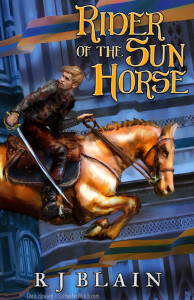
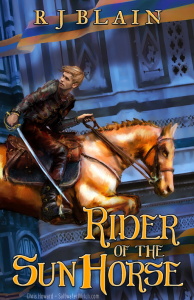
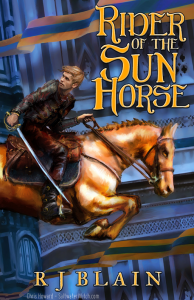
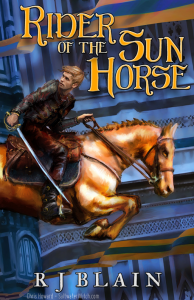
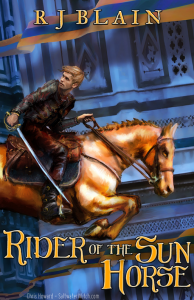
My instant messenger window explodes with images! The font is the same across the board, but we’re looking at the layout at this point.
I quickly decide that #4 is my favorite. I like the silver of my name, and I like how the text spans the top of the cover and uses that space really well. There’s not much discussion at this point. Mostly, I’m flailing and gibbering while she’s laughing at me.
Then, I have a question for Brooke:
RJ: Okay, so, here’s my question for you–do you think using a mixed font in the titling might work?
I’ve seen some fantasy covers where the actual title uses two fonts
She replies it could, and that she’d play with it.
Here is the next bit of our conversation. At this point, Brooke is the one who has to ask questions. I know nothing about graphics or typography. She has to nudge me along and start asking me the right questions so I can tell her the right things for what I want.
Disclaimer: The novels I link are ones I picked because I like the texting on the covers. I’m including the links because that’s really how the conversation went–and I do not believe there is anything wrong with looking at other covers for quality, style, and inspiration. As you can see, the work we did on this cover is our effort. We just looked to see what sort of fonts were being used.
Brooke: so what are you thinking?
more script? blocky? distressed?
~~~
RJ: Hmm… I wonder if maybe of the could remain in that font but maybe more scripty
While it’s not an oozy love story, Lars is definitely motivated through the entire story by his affection for a certain lady
But I’m not sure. o_o
But at the same time, I don’t want it TOO girly
It’s supposed to be a book for either gender
I am browsing fantasy covers for font ideas
sigh heheh
Ir eally like this style of font
http://www.amazon.com/Severed-Souls-S...
It has some scripty flair but isn’t over the top
I also like this style of font
And this one is plainer but really nice
http://www.amazon.com/Skull-Throne-De...
Publishers seem to be currently favoring classier fonts with only small amount of flair
so maybe we should see if we can find something along those lines
A few minutes later, I receive this message and two images:
Brooke: just playing with a masculine look
and then the script cap
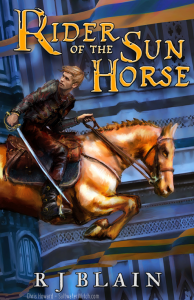
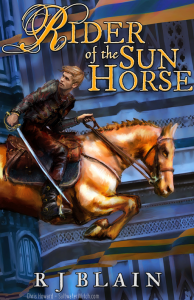
RJ: Oh BLEEP this got a lot harder
lol
I really like both of those with some tweaks
Bleep Bleep!!
Time passes. Brain matter is being forced to do some work.
RJ: Okay, let’s play with the bottom one first, the one with the scripty R
Can we change the R to a font that has the R come down the bottom than at the top in the script? Like the top example’s R
I really like the rest of the font selection on that, but maybe TOO scripty on that R
And I really like how the r tucks down on the upper example
~~~
Brooke: i see what you’re saying
~~~
RJ: But I really like the rest of that font–I think the only thing I might even want to look at is how the words are spaced a tiny bit.
Like the H in horse bigger, and the Sun a bit more predominant (but not by much)
I really like how Sun settles over Horse
~~~
Brooke: i’m going to have to do some font hunting
so, less swirly bits
longer R tail
yar?
~~~
RJ: Yar!
I shall see if I can help find an R
WE SEEK THE R
THE ONE R
AquilineTwo
Maybe Try that one?
It has a flick at the end of it hmm
Pristina has a flicked R too
Pristina actually matches the font really well eyeballing it
(I think it’s from dafont but I have no idea)
~~~
Brooke: let me try that
~~~
RJ: You’re aweeessoommme, have I told you this?
By this point, you’re getting the idea of how the back and forth of this is going. I’m going to spare you the details and the nitpicking we’re tossing at each other–it’s much of the same as what is above. Here is a gallery of what we were tossing back and forth to each other.
Essentially, we spent about an hour discussing the letter R.
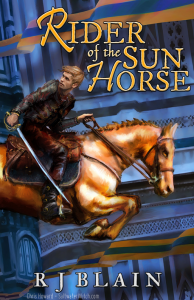
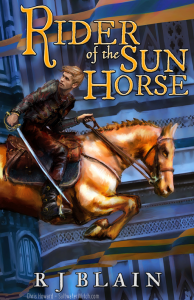
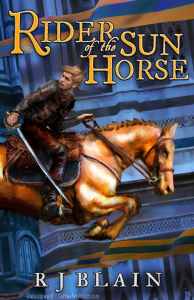
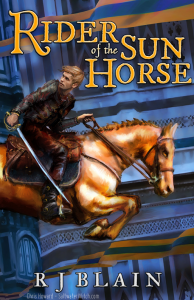
In order to get the R as I wanted, ultimately, Brooke had to photoshop the letter from the original font and distress it to match the rest of the titling. We had to create the letter because it simply didn’t exist in any font directory we had.
Here’s just a tiny peek at the dark path we strode down during the discussion of the letter R:
RJ: I have a love hate relationship with that R
~~~
Brooke: haha
~~~
RJ: I really do, it’s terrible
~~~
Brooke: what don’t you like about it?
~~~
RJ: It looks like the poor thing got BLEEPED and it’s sore >.>
If the R had a rightward drift on the lower part of the letter, I’d Bleeping love it
But it’s kinda afraid to go out and curl that way
like its scared
of whatever is to the right of it lol
~~~
Brooke: hm
sec
~~~
RJ: Since the lower right leg of the R tucks in on itself, it makes it look top heavy. If only the creator of the font hadn’t made it tuck in
I’d probably love the Bleep out of it
This is the ‘final’ mock up of the cover with texting. (This is subject to change depending on the final artwork.)

Rider of the Sun Horse Final Mock Up
From start to finish, it took us two hours to get from the starting versions of the cover to the final version of the mock up.
This is one of the fastest progressions through the typography we have done together. In some ways, I am convinced the typography is the hardest part of the cover creation process. But the text can make or break a cover, and there’s one thing I’ve learned about this process as a self-published author: I have no business attempting typography. I’ll leave it to those with knowledge and experience.
February 2, 2015
The Evolution of a Book Cover
My cover artist is Chris Howard. Before I begin talking about the Rider of the Sun Horse cover, I want to talk about him. He’s really the star of this show, and I really can’t recommend him enough. If you like these covers, check out his site to buy copies of his books. Sometimes he has prints for sale, too.
But onto the real subject here: the evolution of a book cover. Chris and I have a very casual but wonderful writer-artist relationship. When he has time to slip in a cover for me, he does so. I leave him with a veritable treasure trove of cover concepts and ideas for him to work with. (Speaking of which, I need to update my concept and idea file.)
While most authors probably don’t have a commission list multiple covers long, my publication schedule is often in flux. So we work ahead of the books. When the inspiration hits me to really nail a book out and finish it, the cover art is already done and ready for the book. It works great for me, and it allows Chris to work me in whenever he happens to have time. It’s an ideal relationship for the both of us. (Your mileage may vary. I know plenty of people who would be driven insane by this.)
The cover of Rider of the Sun Horse was born from a bunch of random ideas tossed out, with little to no care for grammar, punctuation, spelling, and coherency. Chris speaks RJisms.
Here is a copy paste of the initial description. The BLEEPS are not curses. They’re actually spoilers, which I have cut out so the book isn’t ruined for people.
The main star of the novel is a guy called Lars, and he’s a blond-haired man, in his 30s, good looking, in the rugged aragorn way, except he’s lean. He has a pair of cursed, BLEEP bracelets he wears BLEEP . THe story is about BLEEP , he decides to take matters into his own hands–he decides to participate in a race in order to gain the king’s favor, BLEEP .
There are lots of things we can do with this cover–you don’t have to use a horse unless you want to. It’s general fantasy fare, but I can give you a whole list of scenes that we can use for it when you’re in the mood for working on a cover with that fantasy feel to it.
(It’s in the same world as Storm Without End and Storm Surge–Lars is actually BLEEP BLEEP BLEEP !)
As an addition: While he’s in his 30s (late 30s, actually) he looks more around the 25-30 mark, so he should definitely be a grown young man, but not old either. Somewhere pleasantly in between.
If you decide to take on the challenge of a horse, I have the links to the breed and coloration here: (BLEEP is a horse BLEEP , which favors a real breed of horse.)
http://www.horsesinthemorning.com/wp-content/uploads/2013/01/akhal-teke.jpg
http://4.bp.blogspot.com/-WnsLCC4Xt_o/Tsj4gm5_HGI/AAAAAAAAAXk/mgp0_Zx4cp4/s1600/Akhal-teke+horse.jpg
This is the color spectrum of the horse and breed I’d like to use; a really vibrant almost metallic sun golden chestnut, but if you want to model after an Arabian / Lean Thoroughbred, this is also good! (it’s easier to find model images of those breeds than the Akhal-Teke since the Akhals are rare, especially in that coloration.) If you wanted to use steeplechasing photographs as a model, that would work smashingly well since it’s a cross country race. (Some photos below!)
There is a scene where Lars and his horse are BLEEP BLEEP that might appeal to your love of water (Thus resulting in an image like this http://www.farandride.com/images/photos/new/54984.jpg )
As for tack, here are some images for the type of saddle he’d be using, bridle, the sword he’d have, and so on.
http://s1141.photobucket.com/user/hannahjane2014/media/saddle.jpg.html (It’s based on a WWII cavalry saddle, which is kinda along the right lines)
He uses a cavalry sabre; in the later half of the novel, he BLEEP BLEEP BLEEP :
http://www.kaswords.com/ProductImages/swords_and_displays/military_swords/C-751S-02.jpg
As for attire, he’d be wearing a standard tunic and trousers fit for hard work as well as riding boots:
Example of garb: http://www.devilinspired.co.uk/1355-4913-thickbox/green-medieval-garb-tunic-for-men.jpg
This would be the style of riding boot: http://www.medievalcollectibles.com/images/Category/medium/217.png
Is that enough reference material or do you need more?
That’s a lot of data and links, I know. But I find it really helps to let him get creative with covers. I try to provide Chris with a feel and tone for the book, some links for ideas of mental imagery I’m having, and then I let him go for it!
Here is the first rendition of the cover:

Rider of the Sun Horse – Concept Cover – Art by Chris Howard
At this point, I’m like OH HELLO THERE. my first thought was OMFG, I don’t remember telling him what the city looked like… which is totally in the book.
My second thought is, “Lars looks like Sean Bean!”
And then my head promptly exploded. So, we start emailing back and forth. I’m all down with this, except his hand is bothering me, and while I love Sean Bean (except he always dies, ack!) I am thinking he either needs to be in profile looking forward or he needs to be doing something stupid–like looking over his shoulder instead of paying attention where his horse is jumping.
I also don’t like the red, so I ask for most of the red to be removed from the banners. The royal colors are yellow and blue, typically. While red is used by the nobility, their banners would use blue, and the city favorites white and blue motifs.
This is what he sends back.

Rider of the Sun Horse Cover Art – Concept 2
I immediately fell in love with his face. This is exactly what I was looking for, so I beg Chris to leave his precious beautiful gorgeous face as is. There’s now an issue with his shoulder and I’m still not a fan of the hand, so we start going back and forth on the hand. I’m going to spare you the adjustments to the hand–we did a lot of updated files and back and forth on it. Eventually, because I sucked at pin-pointing what I didn’t like about the hand, I took a photograph of what I wanted with my cell phone. I used my purse as pretend reins.
I’m just classy like that.
Here’s the cell phone picture for your amusement.

This is RJ’s hand!! Purse reins!!!
We have a serious discussion about the positioning of that hand. I think by the time we were done discussing the hand, it was the most-talked about piece of the entire cover art. Rest was all about having too much coffee for coherency, colors of banners, generic giggling, and things of that nature.
You know, the picture perfect example of professionalism. (Not. We have fun, though.)
This is what I got back.

Rider of the Sun Horse – File 58
In the caption, you’ll notice I mention that this is file #58. While he didn’t show me 58 versions, he showed me a lot, and he keeps old saves so we can backtrack if I’m stupid. (Sometimes it happens! Sometimes I’ll toss out an idea that just doesn’t work, so we go back a few versions and try again.)
At this point in the cover art, we are at the final stages. He will do detail work, then he’ll send me some updates–I will confirm it’s done, and he’ll send me the files.
I’m sure he has fixes he wants to make, but at this stage of the game, my part of the work is mostly done.
I can’t say this enough, but I really love working with Chris. He makes the cover art process such a joy.
Now, all I have to try to do is make the book live up to the cover. That’ll be the truly difficult work.
Side Note: Some riders will make mention that the rider’s seat looks wrong. The cover is based on a hard runs in steeplechase. Steeplechase isn’t exactly safe, and riders often end up with some really crappy seats. (And they often fall.)
Lars falls in the book–more than once. I absolutely love the fact that the cover reflects reality; there’s no such thing as a perfect rider or a perfect horse… and his posture really captures the reality of the race. It’s not safe, and some of the shit he pulls is flat out dangerous.
It also reflects that this is fantasy and not the real life. You can’t learn to ride a horse, care for a horse, or how to do anything with horses from a fiction novel.
You need a real horse, a real instructor, and real experience. So, the cover is exactly what it’s meant to be: it’s art.
Enjoy.
February 1, 2015
Sneak Peek: Rider of the Sun Horse

Rider of the Sun Horse – Concept Cover – Art by Chris Howard
I’ve been really busy lately. I’m working on quite a few projects at one time, which leaves me precious little time to work on other things, this blog included. Today, I’m very proud to give you a sneak peek of the concept cover for Rider of the Sun Horse–along with a snippet of the novel, which is also a work-in-progress.
Enjoy!
Rider of the Sun Horse should be finished and for sale sometime later in the year.
~~*~~
Was it suicide, murder, or both if he obeyed his king, sending those under his command to their inevitable, bloody deaths? Lars stared at the letter in his hand, willing the orders to change. They didn’t.
It didn’t matter that his three hundred men and women were the best skirmishers in Kelsh. A force three times their size had no hope of success. His king wanted him and his company dead, and Lars didn’t understand why. The royal messenger, with his beady eyes and graying hair, watched him like a circling vulture over a fresh kill, awaiting Lars’s response.
A sane man would’ve crumpled the parchment, throwing it down in a fit of rage. Lars folded the sheet, tucking it inside his tunic. Sweeping his hand across the table, he pushed the colored flags to the side so he could stare at the map beneath. The border between Kelsh and Danar was a red streak, its color too similar to fresh blood for his liking.
His target was fifty miles to the north beyond the Danar border, a stone fortress in a sea of sand and craggy dunes. If the desert didn’t kill them first, the Danarite scavengers would finish the job easily enough. Suicide or murder didn’t really matter, Lars decided.
Dead was dead.
He straightened, snapping a salute to the royal messenger. “Please send a verbal response,” he said, fixing his stare on the circle indicating the fortress on the map. “We will depart from our current location in one week, per our orders.”
One week might give him enough time to save is men and women. Lars swallowed, picking up a red flag and placing it over the Danarite target. “End response. Dismissed.”
Lars glanced up in time to see the royal messenger smile and snap a salute. Pivoting on a heel, the man turned and left. Drumming a beat on the edge of the table, he considered the map before flicking another red flag into Danar. It fell on its side, the cloth lying limp on the vellum.
Another three flags joined the first two before he managed to set one spinning on its circular, wooden base. When it toppled, it came to rest on the tip of the Rift where it jutted into Danar some hundred miles west and north of the camp’s location.
Lars drew in a deep breath through clenched teeth. Holding it until his chest ached, he considered the map and the pieces scattered over it. He had one week to come up with a plan. Flicking a golden flag, representative of one of his cavalry groups, and watched it come to rest on the far side of Danar, beyond the Rift.
If he could somehow sneak his company through the desert wastes of Danar and then south through Ontherat, they could hide in Mithrias. But how? Lars sent another flag skittering across the table.
It landed in the Rift again. Lars scowled, reclaiming the piece. The Rift, like the orders from his king, offered nothing but death.
If he wanted to reach Mithrias, he had to go around the tip of the canyons, cliffs, and mountains through Danar. If they survived the journey to Mithrias, they could either join an established mercenary company or build a new one. The junta refused contracts from Kelsh or Danar in accordance with the Covenant of the Six Kingdoms. They’d be safe from having to fight their people. The Shadow Council of Mithrias didn’t care about the pasts of the mercenaries under their rule.
They’d be free.
If, of course, he could convince the company to betray Kelsh as they were being betrayed. That was another problem he’d have to solve and fast. Would they? Would his men and women choose to follow him for the sake of survival over the king they had all sworn loyalty to?
With at least three men serving as the king’s spies in his ranks, he couldn’t ask, not openly. How could he come up with a plan that would send them riding across Danar without his company realizing they were defecting to Mithrias?
Lars set the black flag representing the company’s officers on the edge of the map. No matter what he did, he couldn’t involve any of them. If the king’s men caught him in the act of treason, his officers would be innocent of wrongdoing.
Gathering up all of the flags, Lars repositioned them on the map, marking the fortress in red. He clustered his units together in the camp, and wondered how a force of three hundred riders could hope to take on a stronghold occupied by hundreds more, if not thousands.
January 19, 2015
The State of the Blain Address
I figure if the President of the United States can give a State of the Union address (when is that, anyway?) I can give a State of the Blain address. Welcome to 2015 and all of that jazz. I haven’t even written 2014 on any important papers for this year yet. I’m on a roll!
Let me begin with my home life. There are some turbulent things going on in my day to day life. On Friday, it was so bad that my husband kicked me out of the house with a gift card we’d received for Christmas, told me to go shopping, and was glad to be rid of me for a few hours. I don’t need shopping therapy often, but the news had me pretty much in tears, and the husband figured I needed some retail medication–and the best place to send me to do that? The book store. So, off I went with his blessings.
It was something neither one of us were at fault for. Both of our general ability to cope was hammered fairly hard. It happens.
I came home with five moleskine journals. It was really that bad. They were also 20% off. How could I resist that?!
My stress levels were so intense that I, in my dire need to escape reality, destroyed Earth.
Okay, so I wrote a quarter of an entire novel over the weekend. Here’s what it is about:
Project Zeta is a slipstreaming YA apoc Science Fiction exploratory story.
Here is a sneak peek about the beginning of the book:
Some believe the Earth has had enough of humanity and is trying to renew itself. Others believe their planet is dying. Either way, humanity faces extinction due to increased volcanic and earthquake activity.
Meet Dr. Athene Dellis, a fifteen years old geologist with a doctorate in Crystalline Mineralogy and an associate’s degree in Volcanology.
When she was five, she foresaw an earthquake that killed hundreds of thousands in Africa, one of the Earth’s last safe havens. Her attempts to warn others resulted in her being blacklisted, never to permitted membership to one of the twenty-four Projects.
Then her dream changed to the final destruction of Earth, where her sister’s shuttle is destroyed in the eruption triggering the end of all life on Earth.
She has survived so she can change fate and see her sister live, even though it means she’s doomed to be among those left behind.
Athene’s story begins the day the Earth dies.
I’m really in love with this story for far too many reasons to list. It is one of the novels I am determined to somehow add to my publishing schedule for 2015.
Since the thought of my ‘out of our direct control’ home life problems make me stressed, I’m skipping them. Screw them with a stick.
Let’s talk books. Because books. Do I need another reason?
I didn’t think so.
I’ve already mentioned Project Zeta, so I will begin with the novel I will be publishing next: Storm Surge.
This is one of my favorite covers. Kalen and Breton’s story continues. I am hoping to have the novel to my editor on February 15, 2015. After that, I expect approximately two months until completion–if that. Depends on how long it takes my proofing editor(s) to work once my primary editor is done hacking the novel to bits.
Two months seems like a long time, but it’s not. It’ll be frantic. While I’m waiting on Storm Surge’s editorial work to be completed, there is a lot of other work to be done!
Next up is a science-fiction project. I haven’t decided which one I will working on completing next: Zero, Evolulite, or Project Zeta.
Project Zeta is getting a following… but Zero is nearest to completion. Honestly, this also depends on how much work I get done on Project Zeta in the next few weeks. I might do something crazy and split my time half and half between Project Zeta and Zero. This would dump two novels on my editor’s lap at around the same time, but she’s flexible and is already aware this might happen.
After the first round of Science Fiction happens, next up will be The City of Clocks. This has been on the back burner for too long. I have a great deal of work to do on this YA, but I’m eager to get it done. Once again, it already has a gorgeous cover by the talented Chris Howard.

(c) RJ Blain – Cover Art by Chris Howard
I’m really trying to clear out the old projects I’ve been sitting on for a while. Something I’ve always loved about The City of Clocks is the fact that it’s a YA–something that I don’t usually pursue. (Yet I’ll be releasing two of them this year. Two!)
The deal with my YA is that they aren’t really written for teenagers or those who are in the same age bracket. I never really considered the age audience. I wrote stories I am interested in–the marketing and audience element was never a factor in these two novels. But the main characters are, by definition, in the YA bracket.
The City of Clocks is misleading–it’s a fantasy with clocks. It’s not really even a proper steampunk. There’s only one location in this world with clocks like this at all.
It takes place in the same world as Requiem for the Rift King and The Fall of Erelith. Weird, huh?
So, here’s a recap of the to-do list so far for this year: Storm Surge, Zero or Project Zeta or both, The City of Clocks.
Potentially four novels. That’s insane. It’s about to get even more crazy. Because if I’m going to be sniffing the crazy glue, why not snort it all the way, right?
Next up will be the remaining science fiction stories–I am cleaning my entire SF docket this year. That puts the count up to five.
Now, here’s where things get complicated: I am sitting on a story currently entitled Rider of the Sun Horse. The draft is done (I think. I might add another POV. I might not. I will find out when I transcribe it.) I don’t have the cover for this or the three science fictions. If the cover for Rider of the Sun Horse is ready, it will get shunted in line after SS / CoC. Why? Because I will have the cover!
That makes six.
Number seven is Royal Slaves.
You guessed it. Another book with a cover. Hi, book seven!
I have stated Royal Slaves… but I’m not all that far into the novel. So, while I am hoping to squeeze this one in, I would need an epic burst of inspiration and productivity to finish it on time. Truth be told, I am expecting 2016 for this one–but who knows? Because I’m doing so little client editorial, my writing productivity has skyrocketed. I have some client work I am working at, but I’m averaging 2 hours a day on that. The rest of my day is going to my books–or real life stuff.
It has made a huge difference.
Ever since I have significantly cut down on client editorial work and focused on my writing, my battles with depression have gotten much better. I haven’t had an notable episodes in months. Stress levels (with the exception of this week’s idiocy) have been incredibly low. My productivity has also increased tenfold.
I guess it’s true what they say. When working for yourself and only yourself, doing something you truly love, you work better, you work harder, and you work happier.
Here’s to a stellar 2015.
Oops, I punned.
January 1, 2015
Goals for 2015: A Very Tentative Publishing and Writing Schedule
I’m one of those people who needs to have solid goals and deadlines. It’s simply how I work best. If I know I have a job, I sit down and I do it. If I leave things open-ended, I end up flailing uselessly.
I had intended on drafting Rider of the Sun Horse (Title TBD) in 2015 while working on three other projects.
I completed the handwritten draft on December 31, 2014. I was months ahead of schedule thanks to a lot of effort over the holidays. I managed to write a staggering amount while in the car on the way home from Christmas holiday. I wrote a lot at home. I wrote. A lot.
I wasn’t expecting to start 2015 with two completed, handwritten novel drafts and one half-completed novel in the computer. These three books represent three of the four novels I plan to release within the next 7 or so months.
The fourth book is one I’ve been hammering at for a long time. It is a quarter completed. It’s going to be a shorter book, estimated at 80,000 words. The other three are longer, which I have a ballpark estimate of 150,000 words each.
I have a great deal of work ahead of me. Will I succeed? I don’t know. If I do, however, by the end of July, I will release the four following novels:
Traditional Fantasy Rider of the Sun Horse. Title will be changed, as it doesn’t fit as well as I thought it would originally.
Epic Fantasy Storm Surge. This is Book 2 of Requiem for the Rift King.
Traditional Fantasy with steampunk elements The City of Clocks.
Science Fiction/Science Fantasy Zero.
In order to accomplish this, I need to write 1,000 words a day on each of these projects. Some of these projects will be in editorial phase, which is a phrase for ‘one major scene or chapter of edits per day.’
If I am working as I should be, this is approximately 6 hours of work per day.
In reality, this will be approximately 8-10 hours a day.
In addition to this, I will be setting aside 2 hours per day for client editorial until all of my editorial obligations are completed.
The second half of the year is up in the air. If you have any requests or things you’d really like to see me work on, feel free to leave a comment!
Royal Slaves, book 2 of the Fall of Erelith, very probably be a title I work on in the second half of 2015, along with a Science Fiction (Space Opera) entitled Evolulite.
I hope you all have a fantastic 2015.








